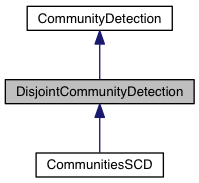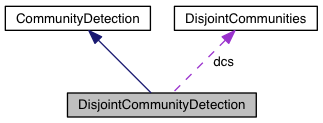DisjointCommunityDetection class. More...


Public Member Functions | |
| virtual | ~DisjointCommunityDetection () |
| Destructor. | |
| virtual void | AddEdgeType (sparksee::gdb::type_t type) |
| Allows connectivity through edges of the given type. More... | |
| virtual void | AddAllEdgeTypes () |
| Allows connectivity through all edge types of the graph. More... | |
| DisjointCommunities * | GetCommunities () |
| Returns the results generated by the execution of the algorithm. More... | |
| virtual void | Run ()=0 |
| Runs the algorithm in order to find the communities. More... | |
| void | SetMaterializedAttribute (const std::wstring &attributeName) |
| Creates a new common attribute type for all node types in the graph in order to store, persistently, the results related to the disjoint communities found while executing this algorithm. More... | |
| virtual void | AddNodeType (sparksee::gdb::type_t type) |
| Allows connectivity through nodes of the given type. | |
| virtual void | AddAllNodeTypes () |
| Allows connectivity through all node types of the graph. | |
| virtual void | ExcludeNodes (sparksee::gdb::Objects &nodes) |
| Set which nodes can't be used. More... | |
| virtual void | ExcludeEdges (sparksee::gdb::Objects &edges) |
| Set which edges can't be used. More... | |
| virtual void | IncludeNodes (sparksee::gdb::Objects &nodes) |
| Set additional nodes that can be used. More... | |
| virtual void | IncludeEdges (sparksee::gdb::Objects &edges) |
| Set additional edges that can be used. More... | |
Protected Types | |
| typedef std::map< sparksee::gdb::type_t, sparksee::gdb::EdgesDirection > | EdgeTypes_t |
| A type definition to store allowed edge types. | |
| typedef std::vector< sparksee::gdb::type_t > | NodeTypes_t |
| A type definition to store allowed node types. | |
Protected Member Functions | |
| DisjointCommunityDetection (sparksee::gdb::Session &s) | |
| Creates a new instance of DisjointCommunityDetection. More... | |
| void | SetCommunity (sparksee::gdb::oid_t idNode) |
| Assigns the current community to the given node. | |
| void | AssertNotCommunityAttribute (const std::wstring &attributeName) |
| Check that the given attribute name is not already in use. | |
| void | CreateGlobalPersistentAttribute (const std::wstring &attributeName) |
| Set a new persistent global attribute to store the disjoint communities information. | |
| void | CreateGlobalTransientAttribute () |
| Set a new temporary global attribute to store the disjoint communities information. | |
| void | RemoveGlobalAttribute () |
| Removes the global attribute where the disjoint communities information is stored. | |
| void | AddEdgeType (sparksee::gdb::type_t type, sparksee::gdb::EdgesDirection direction) |
| Allows connectivity through edges of the given type. More... | |
| void | AddAllEdgeTypes (sparksee::gdb::EdgesDirection direction) |
| Allows connectivity through all edge types of the graph. More... | |
| void | AssertAddedEdges () |
| Check that edges had been added. | |
| void | AssertAddedNodes () |
| Check that nodes had been added. | |
| void | AssertNotComputed () |
| Check that the connectivity had not been calculated yet. | |
| void | SetNodesNotVisited () |
| Set all the selected nodes in nodesNotVisited. More... | |
| void | AssertComputed () |
| Check that the communities had been calculated. | |
| void | AssertEdgeType (sparksee::gdb::type_t edgetype) |
| Check that the given edge type is valid. | |
| void | AssertNodeType (sparksee::gdb::type_t nodetype) |
| Check that the given node type is valid. | |
| sparksee::gdb::bool_t | IsNodeTypeAllowed (sparksee::gdb::oid_t nodeId) |
| Check if the given node has an allowed type. | |
| sparksee::gdb::bool_t | IsEdgeTypeAllowed (sparksee::gdb::oid_t edgeId) |
| Check if the given edge has an allowed type. | |
| sparksee::gdb::bool_t | IsNodeAllowed (sparksee::gdb::oid_t nodeId) |
| Check if the given node is allowed (by type or by explicit inclusion). | |
| sparksee::gdb::bool_t | IsEdgeAllowed (sparksee::gdb::oid_t edgeId) |
| Check if the given edge is allowed (by type or by explicit inclusion). | |
| sparksee::gdb::bool_t | IsNodeExcluded (sparksee::gdb::oid_t node) |
| Check if the given node is forbidden. | |
| sparksee::gdb::bool_t | IsEdgeExcluded (sparksee::gdb::oid_t edge) |
| Check if the given edge is forbidden. | |
| sparksee::gdb::bool_t | IsNodeIncluded (sparksee::gdb::oid_t node) |
| Check if the given node is EXPLICITLY allowed using the include set. | |
| sparksee::gdb::bool_t | IsEdgeIncluded (sparksee::gdb::oid_t edge) |
| Check if the given edge is EXPLICITLY allowed using the include set. | |
Protected Attributes | |
| sparksee::gdb::attr_t | attrCommunity |
| common attribute where the connected component information is stored. | |
| std::wstring | attrCommunityName |
| name of the common attribute where the connected component information is stored. | |
| sparksee::gdb::int64_t | actualCommunity |
| Current community identifier. | |
| sparksee::gdb::bool_t | matResults |
| Materialized results. | |
| DisjointCommunities * | dcs |
| The calculated communities information. | |
| sparksee::gdb::Session * | sess |
| Session. | |
| sparksee::gdb::Graph * | graph |
| Graph. | |
| EdgeTypes_t | edgeTypes |
| Allowed edge types. | |
| std::vector< sparksee::gdb::type_t > | nodeTypes |
| Allowed node types. | |
| sparksee::gdb::Objects * | nodesNotVisited |
| Identifiers of the nodes not visited. | |
| sparksee::gdb::bool_t | computed |
| True if the connectivity has been calculated. | |
| sparksee::gdb::Objects * | excludedNodes |
| The set of excluded nodes. | |
| sparksee::gdb::Objects * | excludedEdges |
| The set of excluded edges. | |
| sparksee::gdb::Objects * | includedNodes |
| The set of explicitly included nodes. | |
| sparksee::gdb::Objects * | includedEdges |
| The set of explicitly included edges. | |
Detailed Description
DisjointCommunityDetection class.
Any class implementing this abstract class can be used to solve a problem related to graph connectivity as finding the strongly connected components, finding the weakly connected components.
Check out the 'Algorithms' section in the SPARKSEE User Manual for more details on this.
Constructor & Destructor Documentation
|
protected |
Creates a new instance of DisjointCommunityDetection.
- Parameters
-
s [in] Session to get the graph from and calculate the communities
Member Function Documentation
|
virtual |
Allows connectivity through all edge types of the graph.
The edges can be used in Any direction.
|
protectedinherited |
Allows connectivity through all edge types of the graph.
- Parameters
-
d [in] Edge direction.
|
virtual |
Allows connectivity through edges of the given type.
The edges can be used in Any direction.
- Parameters
-
type [in] Edge type.
|
protectedinherited |
Allows connectivity through edges of the given type.
- Parameters
-
t [in] Edge type. d [in] Edge direction.
|
virtualinherited |
Set which edges can't be used.
This will replace any previously specified set of excluded edges. Should only be used to exclude the usage of specific edges from allowed edge types because it's less efficient than not allowing an edge type.
- Parameters
-
edges [in] A set of edge identifiers that must be kept intact until the destruction of the class.
|
virtualinherited |
Set which nodes can't be used.
This will replace any previously specified set of excluded nodes. Should only be used to exclude the usage of specific nodes from allowed node types because it's less efficient than not allowing a node type.
- Parameters
-
nodes [in] A set of node identifiers that must be kept intact until the destruction of the class.
| DisjointCommunities* DisjointCommunityDetection::GetCommunities | ( | ) |
Returns the results generated by the execution of the algorithm.
These results contain information related to the disjoint communities found as the number of different components, the set of nodes contained in each component or many other data.
- Returns
- Returns an instance of the class DisjointCommunities which contain information related to the disjoint communities found.
|
virtualinherited |
Set additional edges that can be used.
This will replace any previously specified set of include edges. Using this optional method adds valid edges to the edges of any edge type explicitly set as a valid type. Should only be used to include specific small sets of edges because it's less efficient than just using an edge type. For any edge to be used, both nodes must be also valid.
- Parameters
-
edges [in] A set of edge identifiers that must be kept intact until the destruction of the class.
|
virtualinherited |
Set additional nodes that can be used.
This will replace any previously specified set of include nodes. Using this optional method adds valid nodes to the nodes of any node type explicitly set as a valid type. Should only be used to include specific small sets of nodes because it's less efficient than just using a node type.
- Parameters
-
nodes [in] A set of node identifiers that must be kept intact until the destruction of the class.
|
pure virtual |
Runs the algorithm in order to find the communities.
This method can be called only once.
Implements CommunityDetection.
Implemented in CommunitiesSCD.
| void DisjointCommunityDetection::SetMaterializedAttribute | ( | const std::wstring & | attributeName | ) |
Creates a new common attribute type for all node types in the graph in order to store, persistently, the results related to the disjoint communities found while executing this algorithm.
Whenever the user wants to retrieve the results, even when the graph has been closed and opened again, it is only necessary to create a new instance of the class DisjointCommunities indicating the graph and the name of the common attribute type which stores the results. This instance will have all the information related to the disjoint communities found in the moment of the execution of the algorithm that stored this data.
It is possible to run the algorithm without specifying this parameter in order to avoid materializing the results of the execution.
- Parameters
-
attributeName [in] The name of the common attribute type for all node types in the graph which will store persistently the results generated by the execution of the algorithm.
|
protectedinherited |
Set all the selected nodes in nodesNotVisited.
That's all the nodes of the allowed node types but not the excluded ones.
The documentation for this class was generated from the following file:
- DisjointCommunityDetection.h
